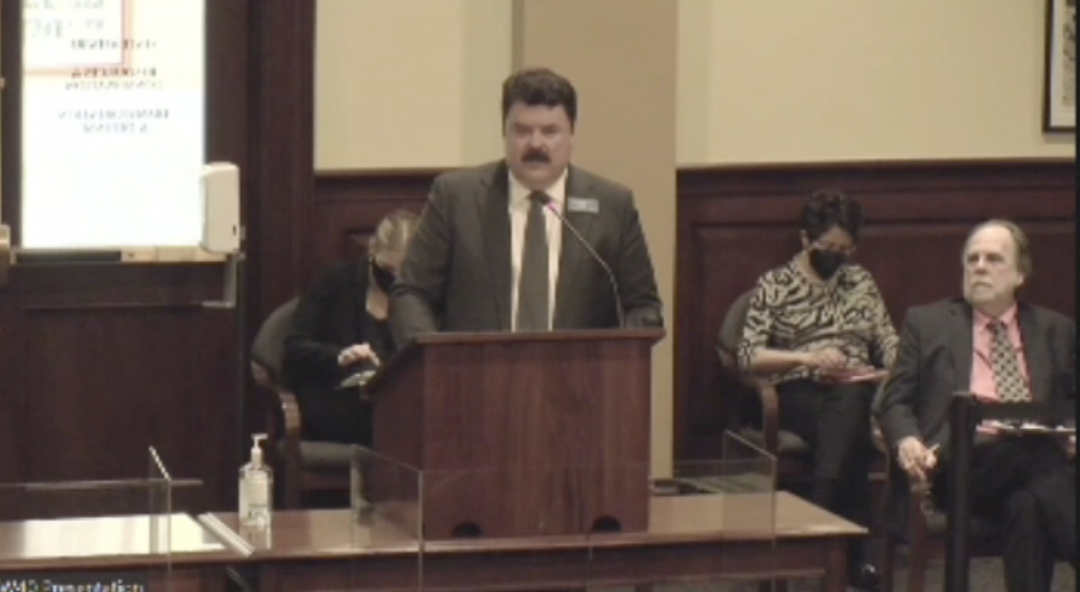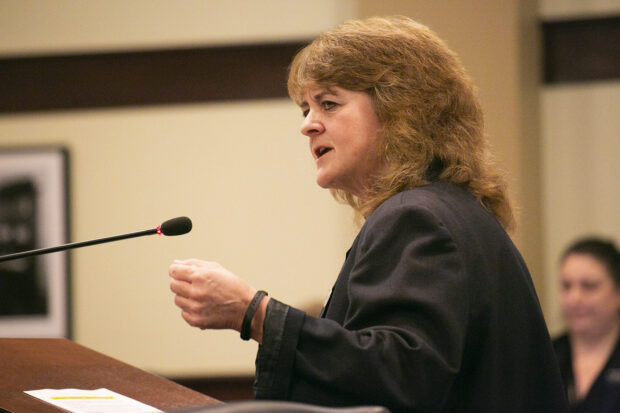Over the objections of education lobbyists and school officials, the House State Affairs Committee endorsed a bill that would eliminate the August school election date.
Supporters touted House Bill 106 as an election integrity bill, saying it would give counties the time to review voter rolls and train their election staffers. And the committee agreed, on nearly a party-line vote.
But school officials saw HB 106 differently. They said the August election date is essential — a last chance for districts to pass a supplemental levy, and use the voter-approved property taxes to stave off midyear spending cuts.
And House State Affairs heard from two Treasure Valley districts that passed levies in August, after voters had said no in last spring’s primary election.
“Not being able to have a levy in August would have been devastating,” Middleton School Board Chairman Kirk Adams told lawmakers.
Adams recounted Middleton’s year of budget struggles. In March, and again in the spring primary, Middleton fell short of the simple majority needed to pass a levy. The Canyon County district cut about $1.2 million from its $25 million budget, and instituted a pay-for-play athletics program. The district also spelled out a plan to cut another $1.5 million if voters again rejected the levy in August.
“Our voters could see. … what we passed as a budget and what that levy would mean to them,” Adams said.
Voters in August approved a two-year, $3 million levy. This allowed Middleton to avoid staff cuts and technology cuts, open an online school in the pandemic, and helped the district resume in-person learning last fall, Adams said.
Like Middleton, West Ada put a levy back on the ballot in August, finally getting approval for a two-year, $28 million levy. Without the levy, the state’s largest district would have had to cut its budget by 5 percent, said West Ada chief financial officer Jonathan Gillen.
The Idaho School Boards Association and the Idaho Association of School Administrators also opposed HB 106.
School districts can seek bond issues or levies on four election days, including the August date. It is by no means the schools’ election day of choice. From 2014 to 2019, about one tenth of bond or levy elections were held in August, according to an Idaho Education News analysis.

Rep. Vito Barbieri, R-Dalton Gardens, and Secretary of State Lawerence Denney are pushing for HB 106.
Eliminating the August election would give elections offices a five-week window for training and administrative work, said Jason Hancock, a former State Department of Education official who now works as Denney’s deputy secretary of state. County clerks’ offices can look into voter registration questions, he said, but as they plan for four elections every year, that work occurs “haphazardly.”
Boise Democrats Chris Mathias and John Gannon and Rigby Republican Rod Furniss opposed the bill. “I have not seen evidence that our elections in Idaho are broken,” Mathias said.
HB 106 now goes to the House floor for a vote.
Guns in schools — and extra credit for voting
It was a busy morning in House State Affairs — with the unveiling of two other hot-button bills with education implications.
House State Affairs introduced a new and slightly rewritten version of a guns-in-schools bill.
The crux of Chad Christensen’s bill is unchanged from a week ago. The Iona Republican would like anyone with an enhanced concealed carry permit to be able to bring a firearm onto school grounds. Currently, school employees can carry a gun only with the approval of trustees or charter school administrators.
The new bill has some language designed to give schools some liability protection — unless someone recklessly fires a gun on school property.
Gannon asked how this language would work, and whether it would extend to an accidental shooting involving a poorly trained gun owner.
“We can do what-ifs all day,” said Christensen, who added that the liability protection would apply only to wanton or willful conduct.
Minutes later, the committee introduced a bill that would prohibit college professors from giving their students extra credit for voting.
Professors can still encourage students to vote, said Rep. Caroline Nilsson Troy, R-Genesee, the bill’s sponsor. But they won’t be able to award extra credit that could, conceivably, affect a student’s scholarship eligibility.
“Maintaining neutrality is what we’re looking for here,” Troy said.
Both bills could come back to House State Affairs for full hearings.
House calls for an end to public health limits on crowds
The House voted nearly along party lines Wednesday to repeal public health limits on crowds and gatherings.
Although legislators said House Concurrent Resolution 5 was about much more than just sports and other school activities, they really didn’t bring much else up during a 20-minute debate.

Pushed by Rep. Barbara Ehardt, R-Idaho Falls, HCR 5 would repeal the 50-person limit on gatherings from Gov. Brad Little’s Feb. 2 Stage 3 public health order.
“It is to make clear that our legislative body is supportive of removing all obstacles that prevent full participation of our individuals in activities, including but not limited to athletic competition,” Ehardt said.
Rep. Brent Crane, R-Nampa, said he and Ehardt pushed the bill after the Idaho High School Activities Association’s board voted to limit attendance for the girls district and state tournaments even lower than what Little and the State Board of Education allow.
“We’ve got a problem with this state tournament,” Ehardt said.
Ehardt also suggested in her floor debate that the IHSAA would limit capacity for girls tournaments, but the organization would not put the same limits in place for the boys tournament in a few weeks.
“I’m just telling you flat out, that’s not fairness in women’s sports,” Ehardt said.
On Wednesday night, IHSAA Assistant Director Mike Federico said the state tournaments for boys and girls basketball will have the same attendance restrictions.
The resolution and Statehouse debate has placed the IHSAA and the tournaments squarely in the middle of a highly charged political debate.
But it’s not clear that passage of the resolution would actually bring more spectators to the girls’ tournament, like legislators say they want. The IHSAA board voted to reduce capacity below the limits that the State Board and the public health order allow today.
“I don’t think the action we’re taking addresses the issue at hand,” said Rep. Marc Gibbs, R-Grace.
Ehardt and Crane said it was about providing clarity and sending a message to the IHSAA that it is time to open up.
“I am going to be able to say that we tried, we tried everything we could to make it possible to give you the opportunity to play and to play in front of your family,” Ehardt said.
The House voted 55-15 to pass the resolution. Reps. Dustin Manwaring, R-Pocatello, Fred Wood, R-Burley, and Gibbs joined House Democrats in opposition. All other House Republicans voted for it.
The resolution now heads to the Senate.
This isn’t the first time this session Ehardt and Crane tried to repeal the limits on crowds and gatherings. They earlier pushed House Joint Resolution 2, which would have done the same thing, but backed off when Little and the State Board allowed schools to fill gyms to 40 percent of capacity.
One innovation bill survives, another fails
The Senate Education Committee killed one school innovation bill Wednesday — and kept a second one alive, albeit barely.
After lengthy debate, and on a narrow 5-4 vote, senators sent an “alternative curriculum” bill to the Senate floor for amendments.
As written, Senate Bill 1046 would allow parents of at least 24 school children to request an alternative curriculum.
The idea, said Rep. Wendy Horman, a bill co-sponsor, is to replicate the student “learning pods” that parents have cobbled together during the pandemic.
“This is essentially a school choice bill within the public school system,” said Horman, R-Idaho Falls.
Senate Education Chairman Steven Thayn, a co-sponsor, said his goal was to make sure public school parents can have some say over their kids’ curriculum — and achieve some of the parental buy-in that charter schools enjoy.
The Idaho School Boards Association and the Idaho Association of School Administrators opposed the bill. Opponents cited several concerns, including the cost of adopting an alternative curriculum; the possibility that parents would seek a religious-based curriculum; and the logistics of setting up an alternative class, especially in a small rural school.
Earlier, and on another 5-4 vote, the committee rejected Thayn’s Senate Bill 1052, a bill to allow parents of advanced elementary school students to seek an alternative class schedule. That flexible schedule could allow a student to stay home one day per week.
SB 1052 was modeled after a similar bill Thayn proposed in 2020. But this year, some committee members questioned the idea of allowing parents to opt their kids out of classes after the pandemic.
“I don’t think this is the time to encourage them to stay home, for even one day,” said Sen. Janie Ward-Engelking, D-Boise.
Idaho Education News covered Wednesday’s hearings remotely.
